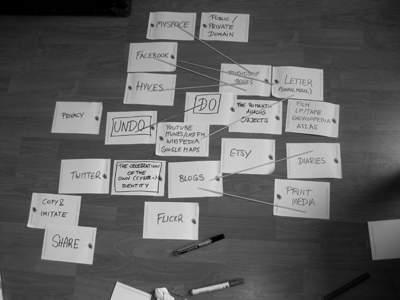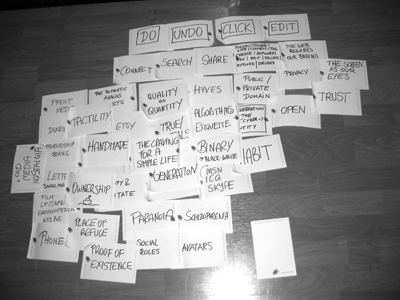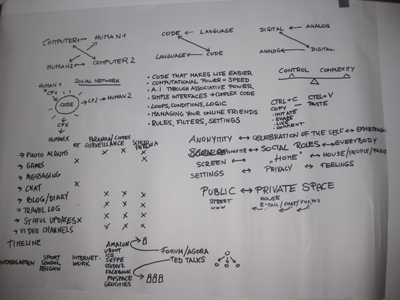User:Birgit bachler/Final Project Proposal
Sketchbook Final Project
Wed, Sep 29 2010
I wish to continue with some of the research I have been doing the first year around social networks, personalization, public/private data and spaces, continuing with an improved version of the soundbook-project from the 2nd Thematic Project. Here are the keywords that randomly come up in order to find the way towards a more formulated idea: tactility, physicality, non-digital networks, drawing/writing circuits, books as a souvenir, handwriting, decay of analogue media, hacking the format of the codex, friendship-books, diaries, postcards, the digitalization of the human mind (reading, writing habits, notes, thoughts), control and centralization of knowledge/history... [to be continued with more clarity and a fancy diagram]
Mon, Oct 4 2010
- Look at mail-art & fluxus
- google for mobile phone, console joypad, thumbs, fingers & Japan
- bit-rot & bit-decay
- the constraint of discreet environments
- jstor databases
- generational issues
- http://pluto.kuri.mu/
- http://www.naipublishers.nl/art/open19_e.html book: open
More Links/References
http://www.theshallowsbook.com/nicholascarr/The_Shallows.html
http://www.wired.com/magazine/2010/05/ff_nicholas_carr/all/1
http://www.amazon.co.uk/gp/product/0141018682/ref=cm_cd_asin_lnk
http://www.scam-detectives.co.uk/blog/2010/01/22/interview-with-a-scammer-part-one/ http://www.neural.it/art/2010/10/enphonic_graphomania_the_visua.phtml
- Computers transporting and mediating human interaction alter our interpersonal communication
- Our perception of privacy and openness shifts through the structure and demands of social networks
- Social networks make us their products
- Social networks makes everyone our "friend" and gives us the only choice to "like" things
- Standardization, customization, protocol, efficiency, debugging
- The craving for a simple life, the romantization of analog media
- Networks that result from mismatches or randomness
- Networks that stimulate the inimitability & singularity of their nodes
- Networks that do not require a complete profile
- Networks that do not require sustainable connections
- Networks that arise from the decay of other networks
- Networks that do not operate in realtime
- Physical networks (architectural, geographical, natural...)
- Temporary networks in state of emergency (e.g. volcanic eruption)



